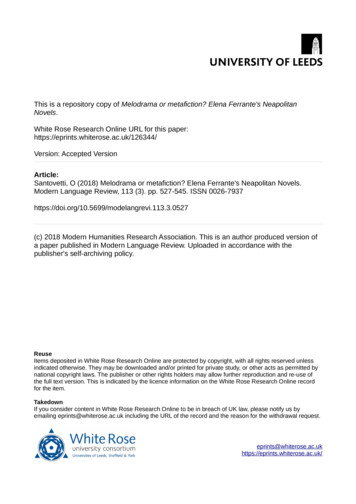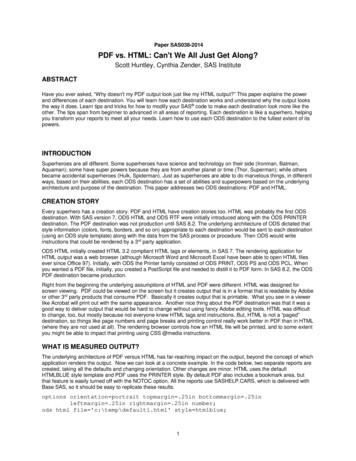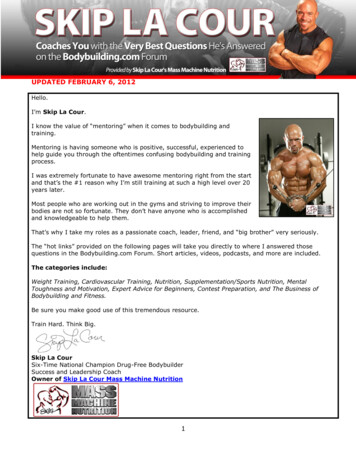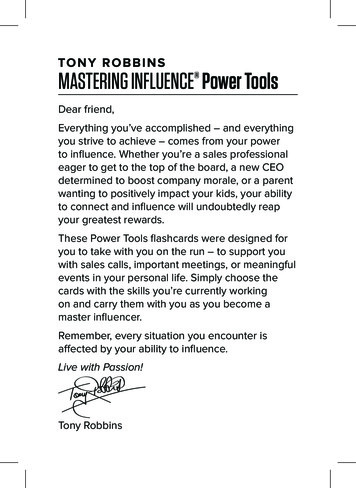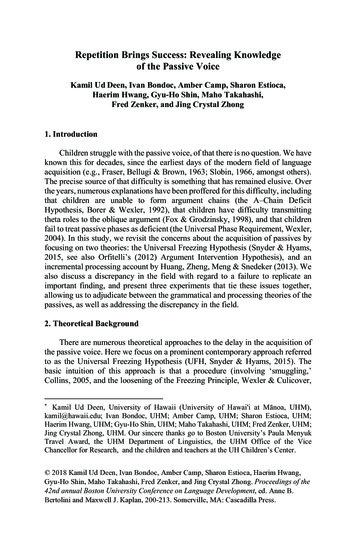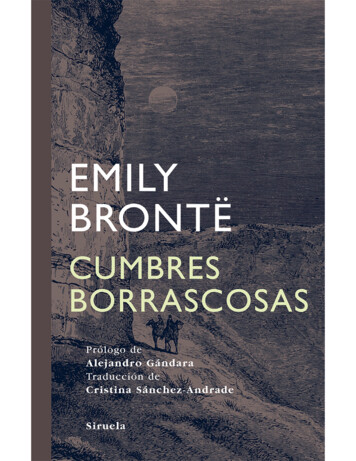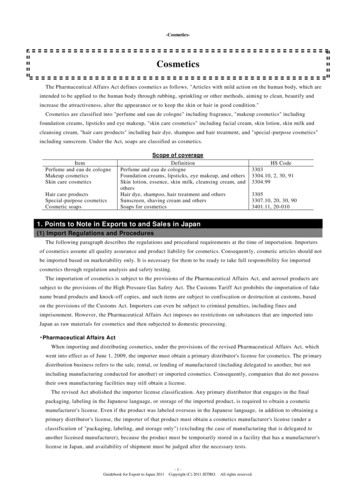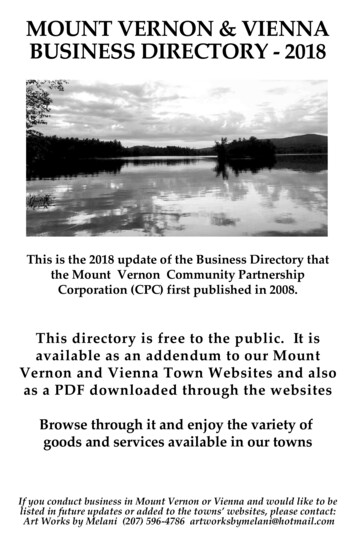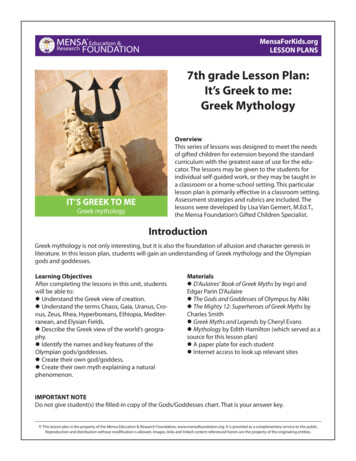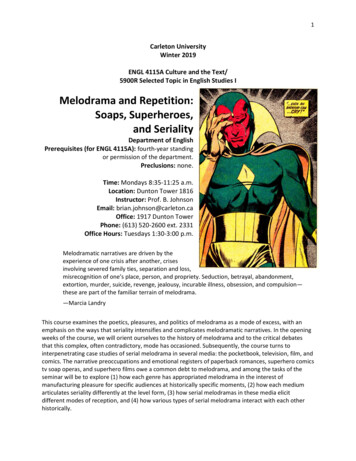
Transcription
1Carleton UniversityWinter 2019ENGL 4115A Culture and the Text/5900R Selected Topic in English Studies IMelodrama and Repetition:Soaps, Superheroes,and SerialityDepartment of EnglishPrerequisites (for ENGL 4115A): fourth-year standingor permission of the department.Preclusions: none.Time: Mondays 8:35-11:25 a.m.Location: Dunton Tower 1816Instructor: Prof. B. JohnsonEmail: brian.johnson@carleton.caOffice: 1917 Dunton TowerPhone: (613) 520-2600 ext. 2331Office Hours: Tuesdays 1:30-3:00 p.m.Melodramatic narratives are driven by theexperience of one crisis after another, crisesinvolving severed family ties, separation and loss,misrecognition of one’s place, person, and propriety. Seduction, betrayal, abandonment,extortion, murder, suicide, revenge, jealousy, incurable illness, obsession, and compulsion—these are part of the familiar terrain of melodrama.—Marcia LandryThis course examines the poetics, pleasures, and politics of melodrama as a mode of excess, with anemphasis on the ways that seriality intensifies and complicates melodramatic narratives. In the openingweeks of the course, we will orient ourselves to the history of melodrama and to the critical debatesthat this complex, often contradictory, mode has occasioned. Subsequently, the course turns tointerpenetrating case studies of serial melodrama in several media: the pocketbook, television, film, andcomics. The narrative preoccupations and emotional registers of paperback romances, superhero comicstv soap operas, and superhero films owe a common debt to melodrama, and among the tasks of theseminar will be to explore (1) how each genre has appropriated melodrama in the interest ofmanufacturing pleasure for specific audiences at historically specific moments, (2) how each mediumarticulates seriality differently at the level form, (3) how serial melodramas in these media elicitdifferent modes of reception, and (4) how various types of serial melodrama interact with each otherhistorically.
2Learning Outcomes: Students taking this course can expect to develop competency in genreand media theory related to melodrama and popular serialization, as well as in the history ofmelodrama as a mode. They will also have the opportunity to practice and develop their skills inthe following areas: (1) reading, summary, and synthesis of complex theoretical arguments; (2)critical analysis and comparison of theoretical claims and methodologies; (3) practical criticalanalysis and comparison of complex primary texts from several media; (4) oral presentation andfacilitating group discussion; (5) advanced writing and research including: topic developmentand project execution.Required Texts: Texts for the course are available electronically through comixology.com (youwill have to open an account and purchase comics online for digital download) and ARES(Carleton Library Electronic Reserves). Films and television shows that are not already availableonline through globaltv.com or Netflix will be screened on campus prior to the days in whichthey are scheduled to be discussed. Screening times will be based on a poll of studentavailability conducted during the first class of term. Students who are not available to attendthe screenings can make arrangements with the professor to view the film and videocomponents of the course at alternate times. Some of the television clips are available atyoutube.com.Course CalendarNOTE: In addition to the class meeting times listed below, students are expected to be availablefor screenings of several films and tv shows at a mutually agreed-upon time outside of regularclass hours. Screenings will be on campus. Students who are unable to attend screenings areexpected to rent and view the films on their own. More difficult-to-find tv episodes will beavailable to borrow and watch in the English Department from the professor.Jan 7Introduction to the CourseScreening: All That Heaven AllowsOngoing Viewing Assignment: Begin regularly watching Days of Our Lives(NBC), available online at globaltv.com. Note that Global allows you to viewonly the most recent 5 episodes of DOOL at any given time, after which theybecome archived and unavailable for viewing without a cable subscription. Inorder to keep up, you will have to tune in at least once a week for the durationof the course. In order to take notes in anticipation of the assignments due onFeb 11 and 25, students are advised to read Williams, Carol Traynor. “It’s Timefor My Story”: Soap Opera Sources, Structure, and Response, Chapter 6“Princesses, Tentpoles, and Real Ericas: Soap Characters as Story ‘Functions’”and Chapter 7 “Blocking and Weaving: The Structure of Soap Opera” (127-57,159-82) early in the term (available on ARES).
3Jan 14What Is Melodrama?Sirk, Douglas (dir.), All That Heaven Allows (1955)Cawelti, John G. “The Best-Selling Social Melodrama.” Adventure, Mystery, andRomance: Formula Stories as Art and Popular Culture. Chicago: U ofChicago P, 1976. 260-295. (ARES)Elsaesser, Thomas, “Tales of Sound and Fury: Observations on the FamilyMelodrama.” (1972) Marcia Landry, ed. Imitations of Life: A Reader inFilm and Television Melodrama. Detroit: Wayne State University Press,1991. 68-91. (ARES)Brooks, Peter, “The Melodramatic Imagination.” The Melodramatic Imagination:Balzac, Henry James, Melodrama, and the Mode of Excess. New Haven:Yale UP, 1976. 1-23. (ARES)Jan 21What Is Melodrama?Rapper, Irving (dir.), Now, Voyager (1942)Berlant, Lauren, “Remembering Love, Forgetting Everything Else,” The FemaleComplaint: The Unfinished Business of Sentimentality in American Culture,Durham: Duke University Press, 2008. 169-205. (ARES)Geldhill, Christine, “The Melodramatic Field: An Investigation.” Christine Geldhill,ed. Home is Where the Heart Is: Studies in Melodrama and the Woman’sFilm. Suffolk: British Film Institute Press, 1987. 5-39. (ARES)Williams, Linda. “Melodrama Revisited.” N. Browne (ed.), Refiguring AmericanFilm Genres: History and Theory. Berkeley: University of California Press,1998. (ARES)Ankler, Elisabeth Robin. “Melodramas of Failed Sovereignty,” Orgies of Feeling:Melodrama and the Politics of Freedom. 225-57. (ARES)Jan 28What Is Popular Seriality?Haynes, Todd (dir.), Far From Heaven (2002)Frank Kelleter, “Five Ways of Looking at Popular Seriality,” Frank Kelleter, ed.,Media of Serial Narrative. Columbus: Ohio State UP, 2017. 7-34. (ARES)Frank Kelleter and Kathleen Loock, “Hollywood Remaking as Second-OrderSerialization,” Frank Kelleter, ed., Media of Serial Narrative. Columbus:Ohio State UP, 2017. 125-47. (ARES)Constantine Verevis, “New Millennial Remakes,” Frank Kelleter, ed., Media ofSerial Narrative. Columbus: Ohio State UP, 2017. 148-66. (ARES)Goldberg, Jonathan, “Preface” and “Identity and Identification: Sirk – Fassbender– Haynes,” Melodrama: An Aesthetics of Impossibility, Durham: DukeUniversity Press, 2016. ix-xvi, 23-79. (ARES)Feb 4Reading Serially: RomancePopular Romance Critical Review Due (summary due on cuLearn by 4 pm Feb 3rd)Student-selected Romances and summaries
4Radway, Janice, Reading The Romance: Women, Patriarchy, and PopularLiterature, Chapter 4 “The Ideal Romance” and Chapter 5 “The FailedRomance,” Chapel Hill: U of North Carolina P, 1991. 119-185. (ARES)McCracken, Scott, “Reading time: popular fiction and the everyday.” DavidGlover and Scott McCracken, eds., The Cambridge Companion to PopularFiction. Cambridge: Cambridge UP, 2012. 103-121. (ARES)Feb 11Serial Melodrama: Soap Opera and FormSoap Opera Study 1: Story Structure DueExcerpts from Dallas (1978), TBADallas(1978), Season 3, episode 12, “Ellie Saves the Day” (series episode 49; airdate: Friday, November 30, 1979)Days of Our Lives (January 7-present)Ang, Ien, “Dallas and the Melodramatic Imagination,” Marcia Landry, ed.Imitations of Life: A Reader in Film and Television Melodrama. Detroit:Wayne State University Press, 1991. 473-95. (ARES)Allen, Robert C., “A Reader-Oriented Poetics of the Soap Opera,” Marcia Landry,ed. Imitations of Life: A Reader in Film and Television Melodrama. Detroit:Wayne State University Press, 1991. 496-524. (ARES)Williams, Carol Traynor. “It’s Time for My Story”: Soap Opera Sources, Structure,and Response, Chapter 6 “Princesses, Tentpoles, and Real Ericas: SoapCharacters as Story ‘Functions’” and Chapter 7 “Blocking and Weaving:The Structure of Soap Opera,” London: Praeger. 127-57, 159-82. (ARES)Feb 18Reading WeekFeb 25Serial Melodrama: Soap Opera and FantasySoap Opera Study 2: Character Function DueDays of Our LivesModleski, Tania, “The Search For Tomorrow in Today’s Soap Operas,” MarciaLandry, ed. Imitations of Life: A Reader in Film and Television Melodrama.Detroit: Wayne State University Press, 1991. 446-65. (ARES)Scodari, Christine. Introduction and Chapters 1-3, Serial Monogamy: Soap Opera,Lifespan, and the Gendered Politics of Fantasy. Cresskill, NJ: HamptonPress, 2004. [Chapters 2-3 available on ARES; Intro and Chapter 1 are atthe reserve desk – you will have to photocopy them from the book.]Spence, Louise. “‘They killed off Marlena, but she’s on another show now’:Fantasy, Reality, and Pleasure in Watching Daytime Soap Operas.” RobertC. Allen, ed. To Be Continued Soap Operas Around the World. New York:Routledge, 1995. 182-98.Mar 4Serial Melodrama: Superhero ComicsSuperhero Melodrama Critical Reviews on The Avengers Due
5The Avengers (1963-1996) #57 “Behold the Vision!” (Comixology)The Avengers (1963-1996) #58 “Even an Android Can Cry!” (Comixology)The Avengers (1963-1996) #59 “The Name Is Yellowjacket!” (Comixology)The Avengers (1963-1996) #60 “ Till Death Do Us Part!” (Comixology)The Avengers (1963-1996) #161 “Beware The Ant-Man!” (Comixology)The Avengers (1963-1996) #162 “The Bride of Ultron!” (Comixology)The Avengers (1963-1996) #227 “Testing 1 2 3!” (Comixology)The Avengers (1963-1996) #228 “Trial and Error!” (Comixology)The Avengers (1963-1996) #229 “Final Curtain!” (Comixology)The Avengers (1963-1996) #230 “The Last Farewell!” (Comixology)The Avengers (1963-1996) #264 “Stings & Sorrows!” (Comixology)The Avengers (1963-1996) #271 “Breakaway!” (Comixology)Sergi, Joe, “Tales from the Code: You’ve Lost That Loving Feeling,” Comic BookLegal Defense Fund, 14 February 2013. ce-comics/ (ARES)Bainbridge, Jason. “‘Worlds Within Worlds’: The Role of Superheroes in theMarvel and DC Universes.” Angel Ndalianis, ed. The Contemporary ComicBook Superhero. New York: Routledge, 2009. 64-85. (ARES)Easton, Lee. “No Endings? No Problem! Reboot, Rinse, Repeat.” Lee Easton andRichard Harrison. Secret Identity Reader: Essays on Sex, Death, and theSuperhero. 237-51. (ARES)Mar 11American Race Melodrama, Film, and Superhero SerialityCoogler, Ryan (dir.), Black Panther (2018)Gillman, Susan, “American Race Melodramas and the Culture of the Occult: AnIntroduction,” Blood Talk: American Race Melodrama and the Culture ofthe Occult. Chicago: University of Chicago Press, 2003. 1-31. (ARES)Williams, Linda, “Trials of Black and White: California v. Powell and The People v.Orenthal James Simpson,” Playing the Race Card: Melodramas of Blackand White from Uncle Tom to O. J. Simpson. 252-95. (ARES)Mar 18Superheroes, Stars, and MelodramaSuperhero Melodrama Critical Reviews on Dazzler DueDazzler (1981-1986) #1 Facsimile Edition (Comixology)Dyer, Richard, “Introduction,” Heavenly Bodies: Film Stars and Society, New York:Routledge, 2003. 1-16. (ARES)Mar 25Soap Opera, Camp, and the RemakeExcerpts from Dynasty (1981), TBADynasty (1981), Season 4, episode 26, “New Lady in Town” (series episode 87; airdate: Wednesday, May 2, 1984.Dynasty (2017), episode TBA
6Feuer, Jane, “Serial Form, Melodrama, and Reaganite Ideology in Eighties TV”and “The Reception of Dynasty,” Seeing Through the Eighties: Televisionand Reaganism, Durham: Duke University Press, 1995. 111-30, 131-48.(ARES)Finch, Mark, “Sex and Address in Dynasty,” Fabio Cleto, ed. Camp: QueerAesthetics and the Performing Subject: A Reader, Ann Arbor: U ofMichigan P, 1991. 143-59. (ARES)Apr 1Superheroes, Romance, Melodrama, and CampSuperhero Melodrama Critical Reviews on Beauty and the Beast DueX-Men: Beauty and the Beast (Comixology)Medhurst, Andy, “Batman, Deviance, and Camp,” Roberta E. Pearson andWilliam Uricchio eds., The Many Lives of the Batman: Critical Approachesto Superhero Media, New York: Routledge, 1991. 149-63. (ARES)Nelson, Tim, “Even an Android Can Cry,” Journal of Gender Studies 13.3 (2004):251-57. (ARES)Fawaz, Ramzi. “‘Where No X-Man Has Gone Before!’: Mutant Superheroes andthe Cultural politics of Popular Fantasy in Postwar America.” AmericanLiterature 83 (2011): 355-88. (ARES)Apr 8Melodrama and Seriality TodayMelodrama Today: Case Studies DueCooper, Bradley (dir.), A Star Is Born (2018)Days of Our LivesGrades and GradingSubmission and Grading of Student Work: Students are expected to submit all assignments inclass on the dates specified below or (in the case of presentations) on the dates for which theysign up. Article presentations will be graded and marks for these posted as promptly aspossible. All other written work will be graded and returned to students AFTER the final class.Students who intend to pick up their term work and wish to receive feedback on theirseminar portfolios must send me an email to that effect in the final week of class.Late Penalty and Absences: If you must miss a class for any reason, email me in advance to letme know. If you have work due on a day you miss class, email it to me prior to the start time ofthe class so that it is not marked late. Three missed classes will be grounds for removal fromthe seminar. Work submitted for credit outside of class will be penalized by 1/3 of a lettergrade per day.N.B. Standing in a course is determined by the course instructor subject to the approval of theFaculty Dean. This means that grades submitted by the instructor may be subject to revision.No grades are final until they have been approved by the Dean.
7Method of e Lesson(s)Seminar PortfolioWeight10%15%75%Due Dateongoingvarious (sign up)ongoing (see below)Attendance & Participation (10%) – In addition to the assignments listed below, you areexpected to attend and participate in every class. Effective participation is less about airtimethan it is about sustained, informed engagement. Come to class having read or viewed theprimary texts ahead of time. Have some thoughts about them that you are prepared to share.Listen actively when your colleagues contribute, and be judicious and thoughtful in yourresponses to them. It’s okay to be quiet for a class or two, but challenge yourself to be an activemember of seminar at all times, whether you are speaking or listening. In general, the reallyimportant intellectual work all happens in the alchemy of the seminar, so be present for it andbe a part of it.Article Lesson(s) (1 x 15% for students of ENGL 4115A; 2 x 7.5% for students of ENGL 5900X) –The purpose of the article lesson is to develop your pedagogical skills by teaching the secondarysource to the class. Your lesson should be short (10-15 minutes max) and must include a 1-2page handout that concisely and accurately summarizes the main argument of the article inapproximately 300-400 words and provides any illustrations, diagrams, and/or examples (drawneither from the article/chapter or from a course text) that help to clarify the article’s mainclaims (approx. 10 minutes). Each presentation should conclude with the presentation of anoriginal example of how one important claim from the article can be brought to bear on a textthat you select that is not from the course syllabus (approx. 5 minutes). Due in class on thedate(s) for which you signed up. Students registered in ENGL 5900X must sign up for anadditional article presentation; for those students, each article presentation will be worth7.5%, for a total of 15% of the final grade.Seminar Portfolio (75%) – Instead of a final essay, this seminar will ask you to work in asustained way throughout the term, trying out new ideas in smaller more localized writtenassignments and then bringing these to class to discuss and share with others. At the end of thecourse, your will have completed FIVE such think-pieces for your portfolio, which will be gradedas a single piece of work in April. In addition to an oral presentation, undergraduate studentsare expected to submit written work totaling 4000 words (roughly 16 double-spaced pages)over the course of the term; graduate students are expected to give two oral presentations andsubmit written work totaling 5000 words (roughly 20 double-spaced pages). All written workshould be in MLA format and must include correct citation and a complete Works Cited list. Seeportfolio assignment details below. Note that all the of the assignment lengths are 250 wordslonger (per assignment) for students registered in ENGL 5900X).
81. Popular Romance Critical Review (15%, summary DUE Feb 3rd; full assignment DUE Feb4th in class) – 750 words (ENGL 4115A)/ 1000 words (ENGL 5900X). Purchase and readany popular romance (it does not have to be published by Harlequin, nor does it have tofeature a heterosexual couple as protagonists). The purpose of this critical review is topresent a concise structural summary of and critical reflection on a romance novel, withreference to Chapters 4-5 of Janice A. Radway’s Reading The Romance. Your structuralsummary of the romance should be objective in tone and economical in style. In oneparagraph of finely honed prose, summarize the work in terms of character functionsand plot developments rather than retelling the story for the purpose of entertainingthe reader. The critical reflection portion of the assignment should follow organicallyfrom this structural summary and can record your subjective response to the work, butit should do so with an eye to autoethnographic analysis rather than mere appreciationor censure. (i.e. How you feel about the work is only important insofar as your responseis itself treated as data for analysis.) NOTE: just the structural summary paragraph mustbe posted to the discussion forum of cuLearn for the class no later than 4:00pm onSunday, Feb 3rd. Then submit your complete Critical Review in class on Feb 4th.2. Soap Opera Study 1: Story Structure (10%, DUE Feb 11th in class) – Blocking Chart 500words (ENGL 4115A)/ 750 words (ENGL 5900X). Create a 1 page blocking chart andfollow-up critical reflection on how some of Days of Our Lives’ plots and characterconfigurations interweave and on the significance of those interweavings. Yourreflection should make reference to at least two secondary sources from the syllabus.Use Chapter 7 of Carol Traynor Williams’s “It’s Time for My Story”: Soap Opera Sources,Structure, and Response (Feb 11) as the basis for this assignment.3. Soap Opera Study 2: Character Function (15%, DUE Feb 25th in class) – 750 words(ENGL 4115A)/ 1000 words (ENGL 5900X). Compare two characters from Days of OurLives in terms of character type/function. The goal of this assignment is either to studycontrasting (or complementary) types OR to make fine distinctions between particularinstantiations of a single character type. Think about how characters are set inrelationship with each other within the show (as friends, relatives, couples, enemies,etc.), and think also about how you might compare two characters who could in theorybe classed as a single type (hero, heroine, bastard, etc.), and how you might explore thesubtle differences between them. Such differences might include variations in storyline,character history (see wikis for deep history), actor/performance, narrative framing(codes), etc. The end result of your analysis should be a clear articulation of how theshow envisions a particular character dyad OR a clear distinction between twocharacters of the same type (including, perhaps, the designation of two subtypes thatyour analysis would name). Use Chapter 6 of Carol Traynor Williams’s “It’s Time for MyStory”: Soap Opera Sources, Structure, and Response (Feb 11) as the basis for thisassignment, as well as any other sources on soap opera from the syllabus.4. Superhero Melodrama Critical Review (15%, DUE in class either Mar 4th, Mar 18th, orApr 1st) – 750 words (ENGL 4115A)/ 1000 words (ENGL 5900X). Drawing on any of the
9secondary sources on comics, melodrama, and/or seriality, select an issue of TheAvengers (Mar 4) Dazzler (Mar 18) or Beauty and the Beast (Apr 1) and develop a criticalanalysis of the story from that issue as melodrama. How does the superhero comic youare analyzing engage with and transform the melodramatic mode? How do its visualstorytelling techniques replicate or complicate those of soap opera? Use this assignmentas an opportunity to develop a close reading of a superhero comic as melodrama. Pleasereproduce any panel or page that receives substantial discussion in your analysis. Thisassignment is due in class on the date your comic is scheduled for discussion.5. Melodrama Today: A Case Study (20%, DUE Feb 25th in class) – 1000 words (ENGL4115A)/ 1250-1500 words (ENGL 5900X). Analyze any text—either from the course or anew text of your choosing—that hazards one possible answer to the question: “What isthe function of contemporary melodrama, and for whom?” This question asks you tosituate a contemporary melodramatic text in relation to both mode and audience, aswell as to frame your answer in terms of pertinent aspects of the cultural history andtheory of melodrama (or some particular melodramatic form). Your analysis of a CaseStudy must include reference to at least 3 secondary sources from the course.Plagiarism: The University Senate defines plagiarism as “presenting, whether intentionally ornot, the ideas, expression of ideas or work of others as one’s own.” This can include: reproducing or paraphrasing portions of someone else’s published or unpublishedmaterial, regardless of the source, and presenting these as one’s own without propercitation or reference to the original source; submitting a take-home examination, essay, laboratory report or other assignmentwritten, in whole or in part, by someone else; using ideas or direct, verbatim quotations, or paraphrased material, concepts, or ideaswithout appropriate acknowledgment in any academic assignment; using another’s data or research findings; failing to acknowledge sources through the use of proper citations when using another’sworks and/or failing to use quotation marks; handing in "substantially the same piece of work for academic credit more than oncewithout prior written permission of the course instructor in which the submissionoccurs.Plagiarism is a serious offence that cannot be resolved directly by the course’s instructor. TheAssociate Dean of the Faculty conducts a rigorous investigation, including an interview with thestudent, when an instructor suspects a piece of work has been plagiarized. Penalties are nottrivial. They can include a final grade of "F" for the course.The university’s Academic Integrity Policy can be found ads/Academic-Integrity-Policy.pdfRequests for Academic AccommodationYou may need special arrangements to meet your academic obligations during the term. For anaccommodation request, the processes are as follows:
10Pregnancy obligationPlease contact your instructor with any requests for academic accommodation during the firsttwo weeks of class, or as soon as possible after the need for accommodation is known to exist.For more details, visit the Equity Services website: -to-Academic-Accommodation.pdfReligious obligationPlease contact your instructor with any requests for academic accommodation during the firsttwo weeks of class, or as soon as possible after the need for accommodation is known to exist.For more details, visit the Equity Services website: -to-Academic-Accommodation.pdfAcademic Accommodations for Students with DisabilitiesIf you have a documented disability requiring academic accommodations in this course, pleasecontact the Paul Menton Centre for Students with Disabilities (PMC) at 613-520-6608 orpmc@carleton.ca for a formal evaluation or contact your PMC coordinator to send yourinstructor your Letter of Accommodation at the beginning of the term. You must also contactthe PMC no later than two weeks before the first in-class scheduled test or exam requiringaccommodation (if applicable). After requesting accommodation from PMC, meet with yourinstructor as soon as possible to ensure accommodation arrangements are made.carleton.ca/pmcSurvivors of Sexual ViolenceAs a community, Carleton University is committed to maintaining a positive learning, workingand living environment where sexual violence will not be tolerated, and is survivors aresupported through academic accommodations as per Carleton's Sexual Violence Policy. Formore information about the services available at the university and to obtain information aboutsexual violence and/or support, visit: carleton.ca/sexual-violence-supportAccommodation for Student ActivitiesCarleton University recognizes the substantial benefits, both to the individual student and forthe university, that result from a student participating in activities beyond the classroomexperience. Reasonable accommodation must be provided to students who compete orperform at the national or international level. Please contact your instructor with any requestsfor academic accommodation during the first two weeks of class, or as soon as possible afterthe need for accommodation is known to exist. modation-for-Student-Activities-1.pdf
comics. The narrative preoccupations and emotional registers of paperback romances, superhero comics tv soap operas , and superhero films owe a common debt to melodrama, and among the tasks of the seminar will be to explore (1) how

